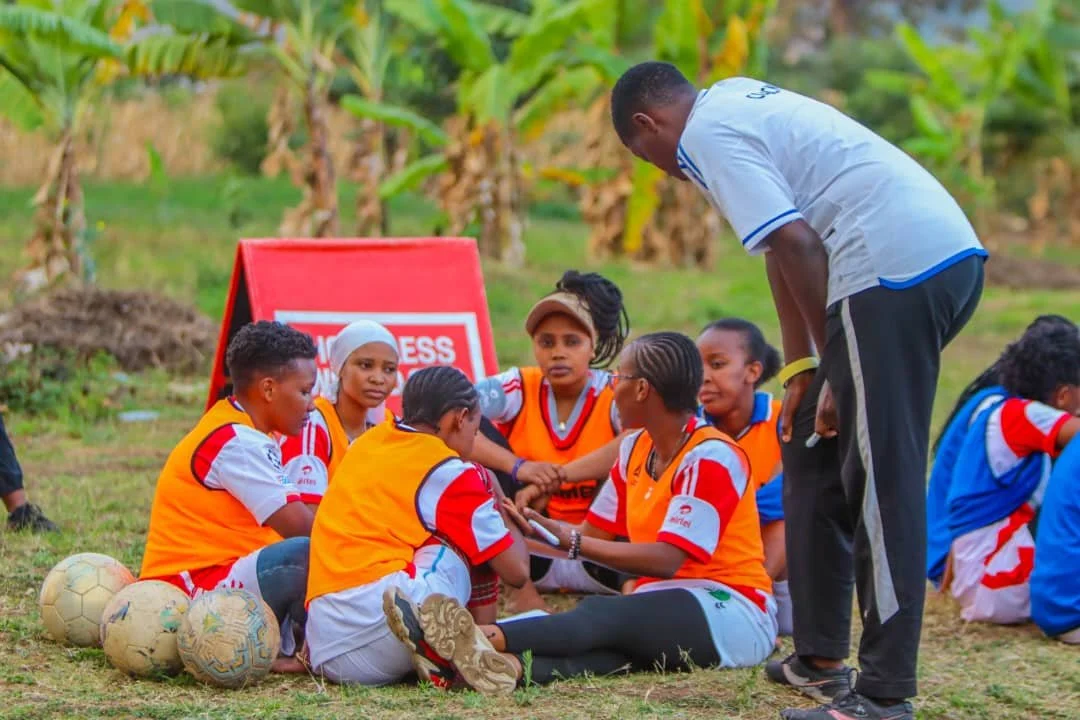Tackling gender-based violence and promoting gender equality using football
|Our #PlayForHer campaign was launched in Arusha, Tanzania at the Africa Women’s Cup.
It’s time to #PlayForHer
25th November 2025 is the International Day for the Elimination of Violence Against Women. It launches 16 Days of Activism against gender-based violence (GBV).
Globally the UN estimates that almost 1-in-3 women have been subjected to physical or sexual violence, or both, at least once in their life*.
At the Homeless World Cup, we are committed to raising awareness of GBV and promoting gender equality through football.
|“There are a lot of women in Zambia playing football. Women come so they can escape the stress in their lives. We talk to them about gender-based violence and teach them how they can be safe,” says Adda Namazuwo who represented Zambia at the Africa Women’s Cup.
Our project Football to Protect Vulnerable Women from Exploitation is a two-year partnership between the Homeless World Cup Foundation, the FIFA Foundation and four African Homeless World Cup delivery partners: Vijana Amani Pamoja (Kenya), Future Stars Academy (Tanzania), Bauleni United Sports Academy (Zambia) and Young Achievement Sports for Development (Zimbabwe).
Coaches on and off the pitch are delivering two curriculums written collaboratively across four countries that challenge society norms on gender-based violence, support women into safe spaces and encourage more positive masculinities amongst young men.
The project demonstrates how sport can be a conduit for social change, particularly in addressing gender-based violence and championing gender equity. A significant achievement has been the co-design and adaptation of a women-centric curriculum across four East and South African countries.
Graduates of the programme become change agents and cascade the information gained to their peers in their respective communities. A male curriculum was also developed to align with the HeForShe campaign to promote positive masculinities. This programme encourages young men to be allies and fight for gender equality by challenging stereotypes and advocating for respect and inclusivity.
|Tanzania is one of the four countries that are part of the two-year programme. Image: Future Stars Academy
“We are nearly half-way into the two-year project and thanks to all the hard work of extremely dedicated and now more highly-trained project staff in four countries, we are smashing the year one targets.
“More than 800 young people are directly benefiting from increased understanding of gender-based violence, how to reduce it, and how young men can be champions of positive masculinities to enable women’s opportunities to prosper,” said Homeless World Cup Partnerships Manager, Zoe Hopkins.
“The project has also allowed staff from the four countries to visit one another to mutually learn from their programmes so that they are stronger as a united front of four African countries effectively addressing the ever-pressing issue of gender-based violence,” she added.
|More than 600 women and girls across the four countries have benefitted from the new curriculum. Image: Vijana Amani Pamoja (Kenya)
“We say in Swahili – ‘Kama si sasa ni sasa hivi’ – if it’s not now, it’s right, right now. This is the time let me tell you” said Nancy Waweru, Regional Hub Manager and Vijana Amani Pamoja’s Head of Programmes.
Our partner in Kenya, Vijana Amani Pamoja found that there was a ‘notable gap’ in their male participants awareness of GBV, which emphasises the importance of the newly developed male focused curriculum, ‘Promoting Positive Masculinity’.
As part of the programme, the inaugural Africa Women’s Cup took place in June in Arusha, Tanzania with eight nations (Kenya, Malawi, Namibia, South Africa, Tanzania, Uganda, Zambia, Zimbabwe) competing for the title.
“I’ve got a new way of thinking about life,” says Zimbabwe’s goalkeeper Rutenda.
This tournament created a platform for showcasing talent and opened global opportunities for personal development, networking, and career growth. Beyond the pitch, the participants have had an opportunity to take part in football coaching and referee training, expanding the spaces of women in sports and stimulating inclusivity in traditionally male-dominated spaces, consequently increasing women's participation in sports.
“The milestones achieved with the project are a true testament to the progress made in the African region by collectively fighting gender based violence and advocating for women's rights,” said Nancy Waweru.
“Step by step, the glass ceiling is cracking, signalling a brighter, more equitable future for women and girls. Pamoja kwa kweli twaweza! (Definitely together we can!) This project proves that football is more than just a game it's a tool for empowerment, resilience, and change,” Nancy adds.
The event was a celebration of female participation in football and raised awareness of gender-based violence.
Zimbabwe’s goalkeeper Rutenda who represented Zimbabwe at the Africa Women’s Cup, explained how football had changed her life: “Sometimes you’ve got no hope, you think what can I get out of this? But I’ve got a lot. I’ve got a family. I’ve got peace. I’ve got a new way of thinking about life. Leaving my issues behind and actually focusing on tomorrow.”
Ahead of the tournament, 15 participants, the majority female, from Tanzania and Kenya were trained as referees by Homeless World Cup referees Natalie Handley and Paul Nagtegaal.
|15 trainee referees were put through their paces in Arusha, Tanzania ahead of the Africa Women’s Cup.
Through the partnership, participants in Tanzania, Kenya and Zambia have also had the opportunity to receive coaching courses from their respective FAs, allowing some to complete their Level D CAF coaching course. This gives them new skills, benefiting both the individual, and the local partners that now have stronger coaches.
The Homeless World Cup is committed to working towards SDG 5 - achieve gender equality and empower all women and girls. We are also a member of Football for the Goals.






